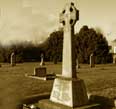 |
War
Memorials Elsewhere, - National Memorial Arboretum (Alrewas, Staffs) |
 |
Since planting began in 1997, the National Memorial Arboretum has been a special place honouring those who have served, and continue to serve, the nation in many different ways. 50,000 trees are planted here, where older and younger generations alike can wander and wonder.
There are more than 200 dedicated memorials on the site making the Arboretum a living tribute that will forever acknowledge the personal sacrifices made by the Armed Forces and civil services of this country.
Of relevance to remembrance of men of the Yorkshire Regiment is
a. A memorial tablet for men of the Scottish
Union and National Insurance Company that was recovered after the company
was closed down. This is located beside chapel for the National Memorial Aboretum.
Among the 36 names of past employees of this company is that of one soldier
of the Yorkshire Regiment.
b. The memorial to those who were Shot at Dawn.
and
c. The Memorial to First World War VC winners who were born overseas. This includes a Memorial to Major Stewart Loudoun-Shand, VC.
Scottish Union and National Insurance Company
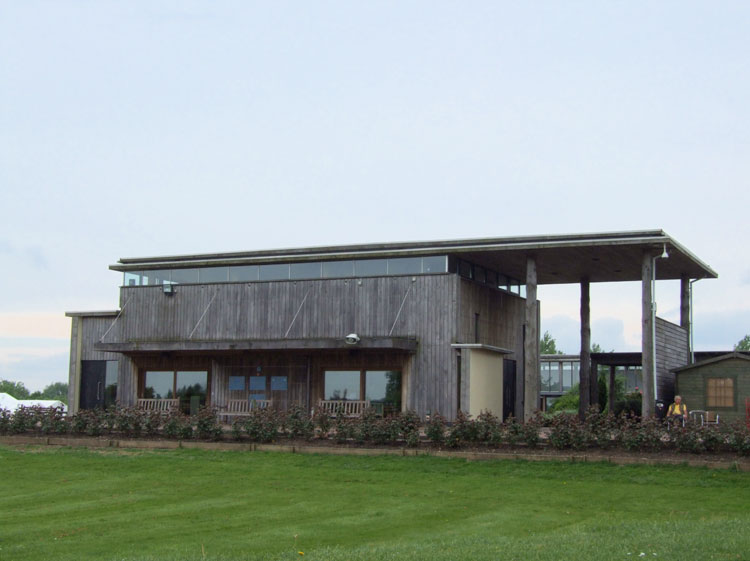 The
Chapel in the National Memorial Arboretum, Alrewas - Staffs
The
Chapel in the National Memorial Arboretum, Alrewas - Staffs
(Photo : Richard Roberts <richard.nsw@googlemail.com>)
To the right of the chapel in the photo above is a planked wall. On the face of the wall facing the chapel are several memorial plaques, amongst which is one for employees of the Scottish Union and National Insurance Company. This memorial plaque was recovered after closure of the above company. One Officer who served with the Yorkshire Regiment is commemorated on this memorial.
2nd Lieutenant Joseph Alfred Child. 9th Battalion the
Yorkshire Regiment, attd. 69th T M Bty. Son of Mary Louisa Child, of 6, Moorland
Mount, Cleckheaton, Yorks, and the late Ben Child. Born at Liversedge, Yorks.
Killed 7 June 1917. Aged 23.
Buried BEDFORD HOUSE CEMETERY.
(A biography of Lieutenant Child is provided on the War
Time Memories Project website.)
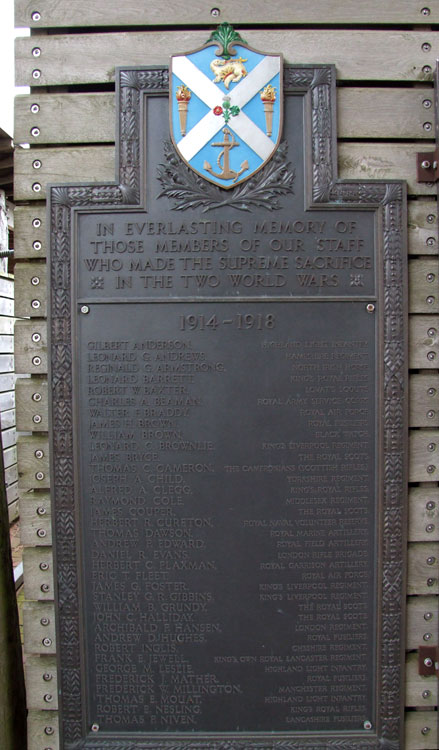
The Scottish Union and National Insurance Company Memorial
Select the above image for a larger sized one which opens in a new window.
(Photo : Richard Roberts <richard.nsw@googlemail.com>)
The Memorial to Those Shot at Dawn
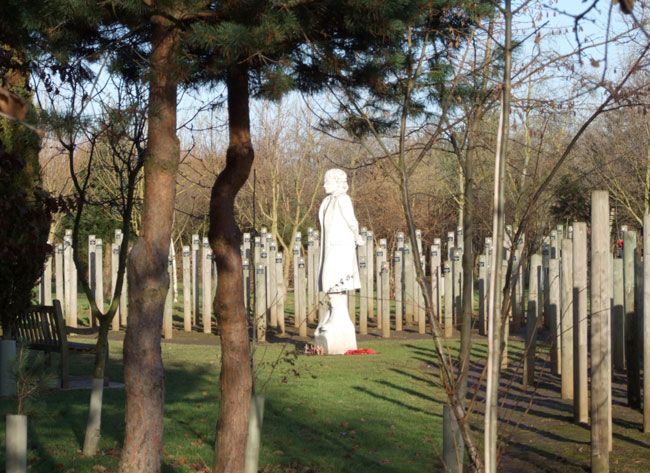
The Memorial to those Shot at Dawn in the National Memorial Arboretum, Alrewas
- Staffs
(Photo : Richard Roberts <richard.nsw@googlemail.com>)
The memorial to those Shot at Dawn in the National Memorial Arboretum (Alrewas, Staffs) commemorates over 300 British and Commonwealth soldiers who were shot for desertion or cowardice during the First World War. Most of them were sentenced after a short trial at which no real opportunity for defence was allowed.
Today, it is recognised that several of them were under age when they volunteered and that many of them were suffering from shell shock or post traumatic stress disorder. Andy Decomyn's statue 'Shot at Dawn' (see photo above) is modelled on Private Herbert Burden, of the 1st Battallion Northumberland Fusiliers, who was shot at Ypres in 1915 aged 17. His name, and the names of those others who suffered the fate of being shot at dawn are listed on the stakes arranged in the form of a Greek theatre around the statue, symbolising the tragedy that these events signify. The location of this memorial in the most easterly point of the Arboretum which means that it is the first place to be touched by the dawn light.
Two soldier of the Yorkshire Regiment, and one former soldier of the Yorkshire Regiment, are commemorated on this memorial.
In 2006, a mass pardon of British and Irish soldiers executed during the Great War was enacted.
Private James Crampton. 34595. 9th Battalion the York
& Lancaster Regiment, formerly 10641the 6th Battalion the Yorkshire Regiment.
Son of George and Elizabeth Crampton, of Scarborough, Yorkshire. Killed 4
February 1917. Aged 39.
Buried POPERINGHE NEW MILITARY CEMETERY
.
Private Crampton was a Reservist at the outbreak of war, and re-joined the
6th Battalion the Yorkshire Regiment. He was with the Battalion throughout
the Gallipoli campaign in 1915. When the 6th Battalion arrived on the Western
front in July 1916, Private Grampton was transferred to the York & Lancs
Regiment. On 16 August 1916 he was detailed for work in the front line with
the Royal Engineers, but absconded. He remained nearby in Armentieres for
the next three months, without any apparent plan or motive and without any
equipment. He was arrested and subsequently executed.
Note: Although his headstone shows the name "Grampton", his entry
in the book "Shot at Dawn" by Julian Putkowski and Julian Sykes
records him as "Crampton".
Note: Although the headstone in in Poperinghe New Military Cemetery originally
showed the name "Grampton", his entry in the book "Shot at
Dawn" by Julian Putkowski and Julian Sykes records him as "Crampton".
A new headstone with the name "Crampton" will replace the "Grampton"
headstone.
HIs entry in the Register of Soldiers Effects shows "Grampton",
but alias "Crampton".
Other records (Soldiers Died in the Great War, Medal Rolls Index, Graves Registration
etc.) show "Grampton".
However, it was subsequently established that the correct surname was "Crampton"
and "Grampton" seems to have resulted from a clerical error at his
court martial.
In 2012 his correct name was added to the Oliver’s Mount memorial in Scarborough.
Private Harry Poole, 8534. 7th Battalion Yorkshire
Regiment. Son of Mr. A. Poole, of 9, Bernard St., Park, Sheffield. Killed
9 December 1916. Aged 22.
Buried CAVILLON COMMUNAL CEMETERY.
(Not shown in SDGW, but from 1911 Census data was born and resided in Sheffield).
Harry Poole is simply recorded as having deserted in the book "Shot at
Dawn". No further details are given.
Drummer Frederick Rose, 9552. 2nd Battalion Yorkshire
Regiment. Son of Mrs. E. Rose. Killed 4 March 1917. Aged 23.
Buried BERNEVILLE COMMUNAL CEMETERY.
(Not shown in SDGW).
Drummer Frederick Rose had been a regular soldier in the 2nd Battalion, and
had been with the Battalion when it first arrived in Belgium (see 2nd
Battalion Roll). He went missing on 18 December 1914, but apparently spent
the next two years living with a woman in Hazebrouck. He was reported to the
police by a neighbour of this woman and was captured shortly afterwards.
Drummer Rose would have been one of only a small number of survivors of the
2nd Battalion. The Battalion had been in action near Ypres in October 1914,
and a very high number of men had been killed, captured, or wounded.
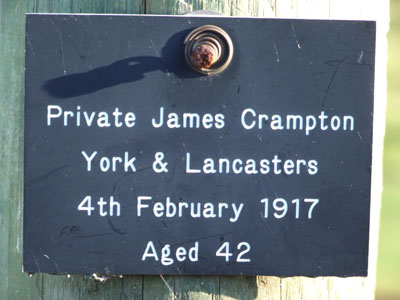
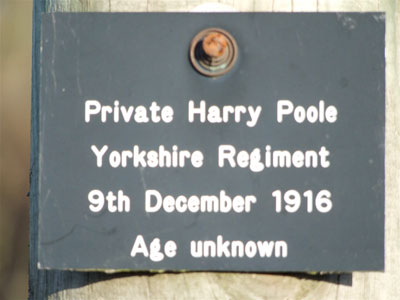
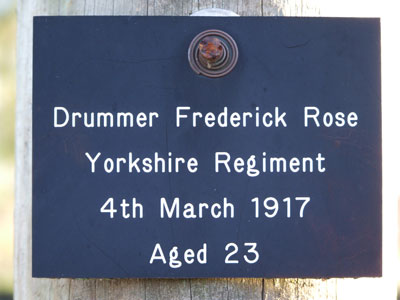
The Memorials in the National Memorial Arboretum, Alrewas
- Staffs,
to the Yorkshire Regiment Soldiers who were Shot at Dawn.
(Photo : Richard Roberts <richard.nsw@googlemail.com>)
The Memorial to First World War VC Winners Who Were Born Overseas
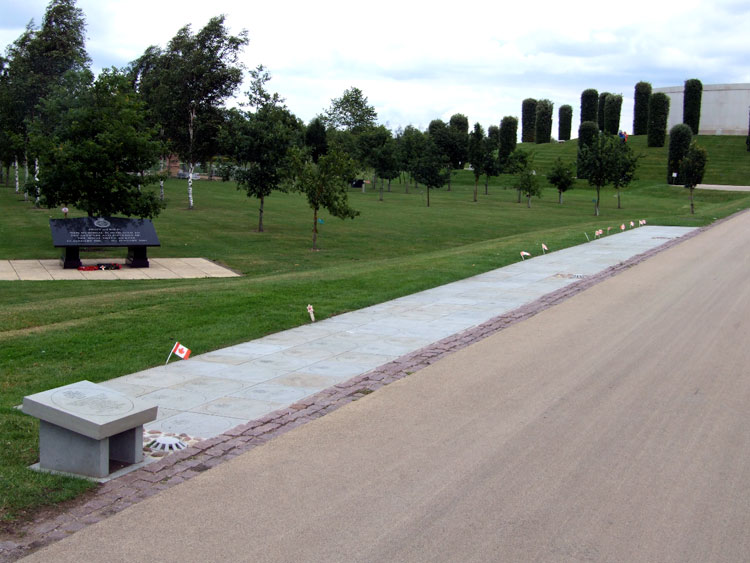 The
Memorial to First World War VC Winners Who Were Born Overseas (1)
The
Memorial to First World War VC Winners Who Were Born Overseas (1)
(Photo : Richard Roberts <richard.nsw@googlemail.com>)
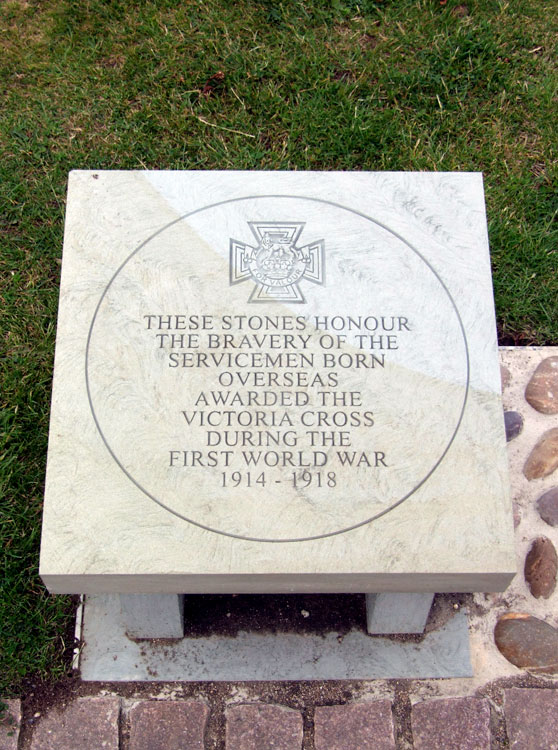
The Memorial to First World War VC Winners Who Were Born Overseas (2)
(Photo : Richard Roberts <richard.nsw@googlemail.com>)
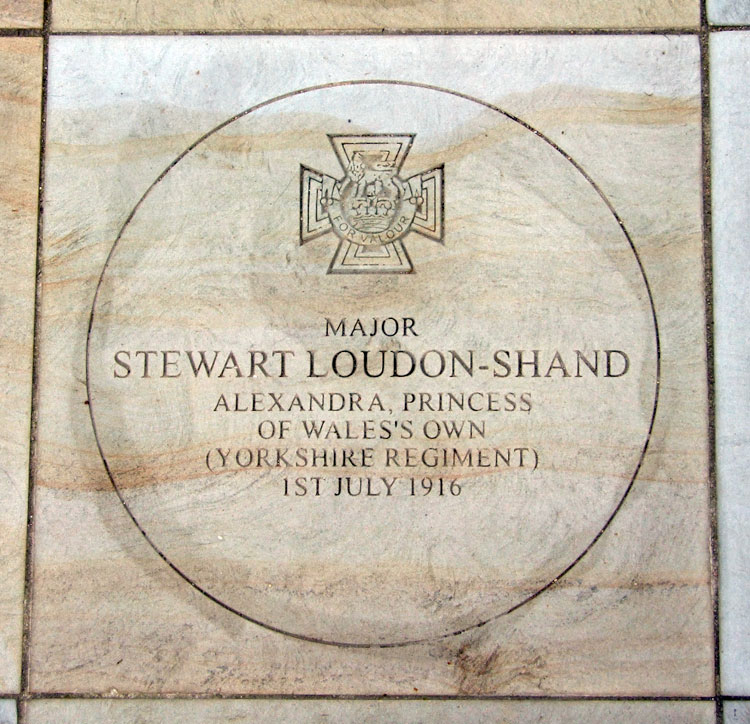 Major
Loudon-Shand's Commemoration on the Memorial to First World War VC Winners
Who Were Born Overseas
Major
Loudon-Shand's Commemoration on the Memorial to First World War VC Winners
Who Were Born Overseas
(Photo : Richard Roberts <richard.nsw@googlemail.com>)
Major Stewart Walter Loudoun-Shand, VC. 10th Battalion
Yorkshire Regiment. Son of Mr. J. L. Loudoun-Shand, of 27, Alleyn Park, Dulwich,
London. Killed 1 July 1916. Aged 36.
Buried NORFOLK CEMETERY, BECORDEL-BECOURT.
(Note : Incorrect spelling of "Loudoun-Shand" on the above commemoration.)
Stewart Walter Loudoun-Shand was born in Ceylon, now
Sri Lanka, on the 8th October 1879. He was the second son of Mr and
Mrs John Loudoun-Shand, tea-planters, who had five sons - all of whom served
in the Great War - and five daughters. The family returned to Dulwich
in south east London and lived at Craigelle, 24 Alleyn Park, from where they
sent the boys to Dulwich College. Stewart excelled as an athlete and
cricketer and his youngest brother, Edward, was renowned as a rugby footballer,
later to play for Oxford University and Scotland.
In 1896, Stewart took up an appointment as a Bank Clerk with William Deacon's
Bank, and served as a volunteer with the London Scottish. When the
Anglo-Boer War broke out in 1899 he immediately volunteered and served with
the Pembroke Yeomanry as a Lance Corporal in South Africa. After 18
months service, in 1901, he accepted a post with a mercantile company in Port
Elizabeth on the southern tip of the Cape Colony. There he stayed for
three years gaining experience before travelling to Ceylon to take up a position
which his father had found for him as a tea merchant.
When war broke out in 1914, Stewart Loudoun-Shand hurried home to England
to volunteer, and subsequently gained a commission in the Green Howards, aged
35 years old. He was posted to the l0th Yorkshires and trained in Halton
Park and Whitley Camps near Bagshot. He was promoted to Captain on
14th June 1915. On arrival in France, his battalion fought in the Battle
of Loos in September 1915 and, because of heavy officer casualties, on 12th
December Loudoun-Shand was given the rank of Temporary Major to command 'B'
Company.
Major Stewart Loudoun-Shand was awarded a posthumous VC for his bravery
in the Battle of the Somme on 1st July 1916. The announcement
of his posthumous Victoria Cross was published in The London Gazette on the
9th September 1916. His father received the award at Buckingham Palace
from H.M. King George V on 31st March 1917. He is buried in Norfolk
Cemetery Plot I, Row C, Grave 77 at Becourt, some three miles east of Albert,
on the Somme. His VC and medals are held by his family.
-----------------> Return to top of the page